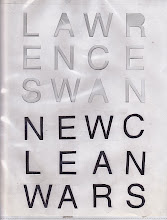Gotta Dance?
I dreamed I was asked to participate in a ballet about brain science. I write some notes on index cards, drawing on memories of seminars in the philosophy of mind and cult sci fi movies. During my part of the performance I toss a die that has no numbers, only Xs on each side. Vanna White retrieves the die after each throw, calling out numbers I can't see. In response to each number, neural impulses dance mental functions. After each throw, as Vanna returns the die, I fan out the index cards and she selects one for me to read, so the notes are read in random order. I throw the die fourteen times and read fourteen notes.
- Hippocrates: "Men ought to know that from nothing else but the brain come joys, delights, laughter and sports, and sorrows, griefs, despondency, and lamentations... And by the same organ we become mad and delirious, and fears and terrors...and dreams and untimely wanderings, and cares that are not suitable,,. All these things we endure from the brain..."
- If the mind is identical to the brain, then "mental events" are theoretically observable phenomena, and the neural process called "thought" can theoretically be observed by a neuroscientist.
- In 1909, a German anatomist named Korbinian Brodmann published a map of the brain to help anyone who lost his mind to find it again.
- I think, therefore electro-chemical signals pass from neuron to neuron, and information is processed and transmitted throughout my central nervous system, therefore I am?
- If you lose your mind, you can be re-minded, but can only the dis-membered re-member?
- In the 1962 movie, The Brain That Wouldn't Die, a scientist whose fiancee was decapitated in a car crash takes her head to his laboratory where he keeps her brain alive while he plots the murder of a beautiful woman so he can attach his girlfriend's mind to a live body.He keeps the brain in a pan in his lab. Fans of the film call her “Jan in the pan.”
- Some philosophers discuss problems in the philosophy of mind by using a thought experiment known as "the brain in the vat," which is a modernized re-telling of Descartes' "Demon Hypothesis."
- In his Meditations on First Philosophy, Descartes considered the possibility that the world apprehended by his senses was not real but a hallucination, or dream, or a trick played on him my a malevolent, powerful god. or demon.
- I never really felt I had to prove to myself that I was not a brain in a vat.
- How is being a brain in a vat different from being an individual in the cosmos? The captive brain moves, though its movements are microscopic, and my travels are microscopic in relation to the cosmos. Also, I am as dependent on a material environment of random events as the hypothetical brain is to its liquid-filled vat.
- Dreams might be caused by the forebrain trying to make sense of the scrambled sensory information which is the result of random firings of neurons in the cerebral cortex.
- Do you hear voices in your head? Of course. How else would I hear them, if they didn't enter my head through my ears?
- Where in my brain am I?
- Julia told me we are not here to solve problems, but to create them, and I think the problem of choreographing a theory of neuroscience is a special instance of the mind-body problem. Brodmann Areas, everybody gotta dance!
http://nortemaar.org/projects/the-brodmann-areas-a-new-ballet/
Julia Gleich
Tamara Gonzalez
Ida Josephsson (Vanna White) and Morgan McEwen (seated).






0 Comments:
Post a Comment
<< Home